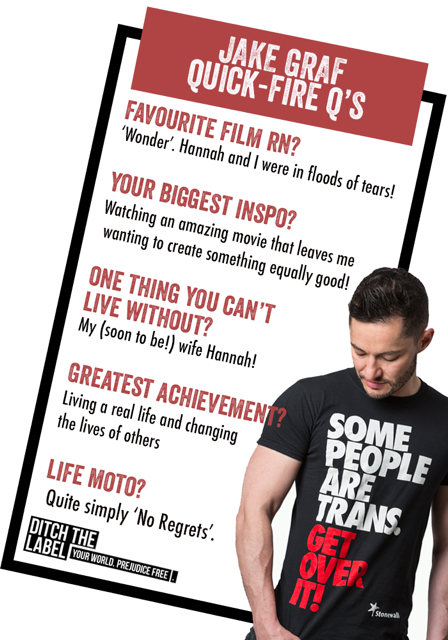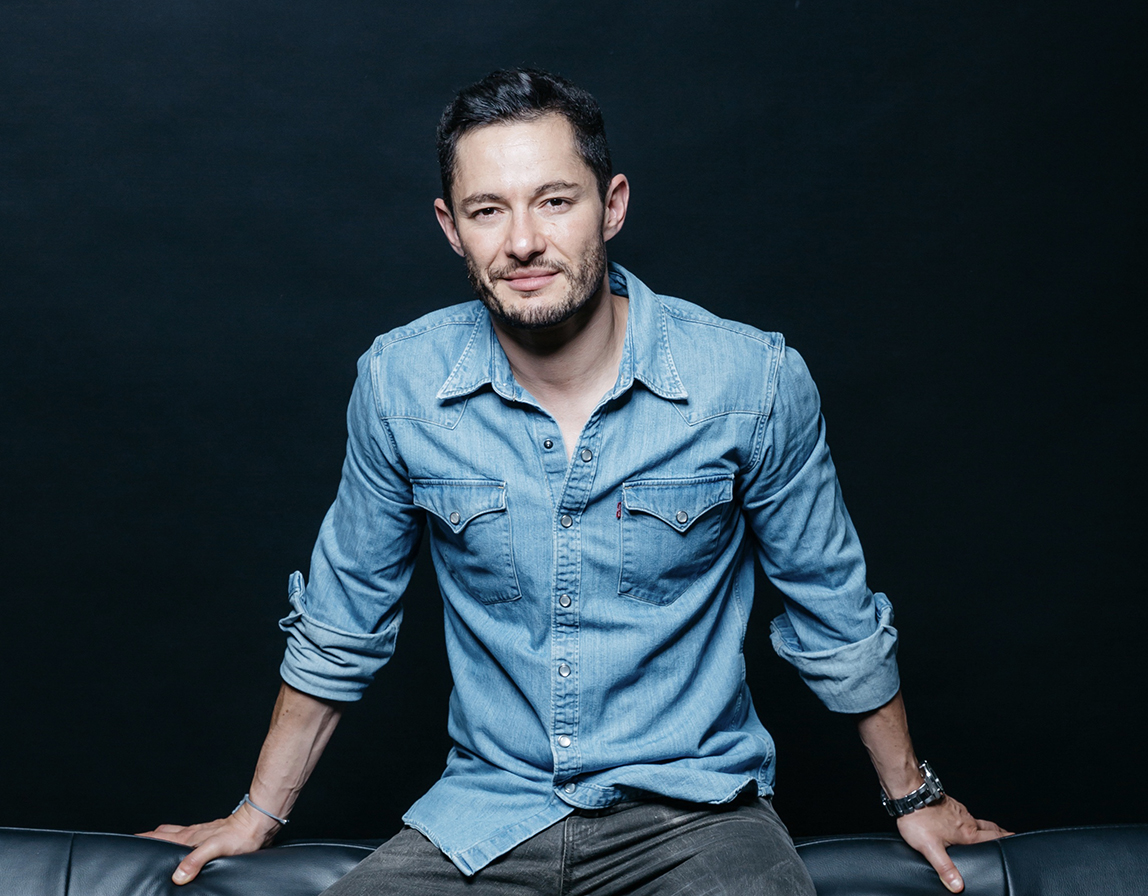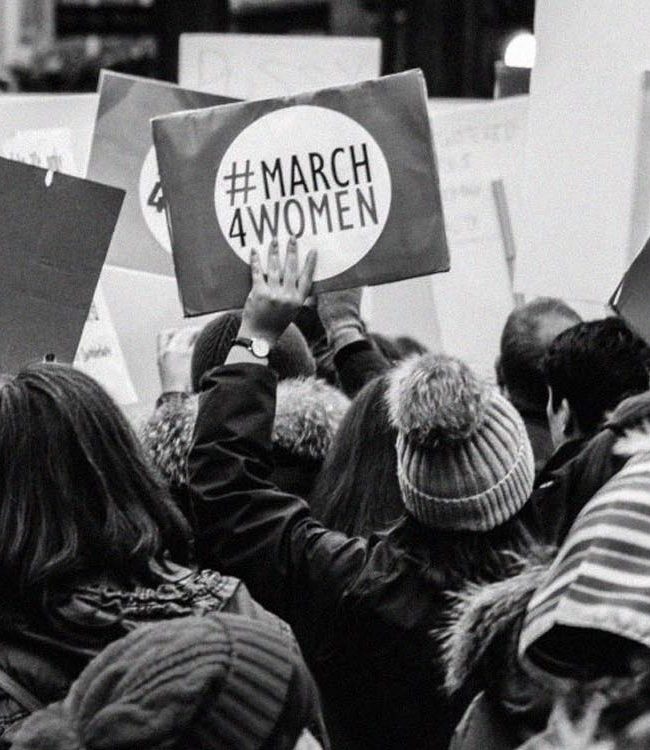Meet the latest addition to our squad of ambassadors: Jake Graf. As a director, Jake’s latest film shines a light on the experiences of transgender people and what its like to be trans in a society that doesn’t know you exist. Here’s what happened when we caught up with Jake…
DTL: Hi Jake, Thanks for chatting with us! As a writer, actor and award-winning director, it’s safe to say you have had some pretty impressive achievements! Can you tell us a bit about why you wanted to get involved with DTL?
Jake: Ditch the Label is such an important project and charity, it’s an honour to be involved! As someone who grew up feeling very much like an outsider, being bullied at school and turning to some pretty destructive behaviour because I had no one to look up to, I’m really aware of just how important it is to have visible role models for younger LGBTQIA kids today. When I hear and read daily about the continued and relentless bullying of gay, bi, trans and queer kids in schools it just makes me more determined to do anything I can to help make it stop. Whether that’s being visible, making films that help people better understand us or just being someone that younger folk can reach out to and talk to, then I’m happy to do it.
DTL: You recently created a short film about the everyday struggles that trans people face. Talk us through the inspiration behind it all?
Jake: Last year’s ‘Headspace’ short film came about after an evening out with several trans friends describing some of their most awkward moments as ‘passing’ trans people and how certain situations could sometimes be harder because no one could tell that they were trans. The voice-over allowed the viewer to really get inside the heads of the actors in the film, and see things from our perspective. From the gym towel changing scene to the struggles with being misgendered over the phone and the challenges of using public toilets, they were scenarios that really resonated with the broader trans community, while also helping the cisgender community better understand how difficult seemingly innocuous daily experiences can be for us.
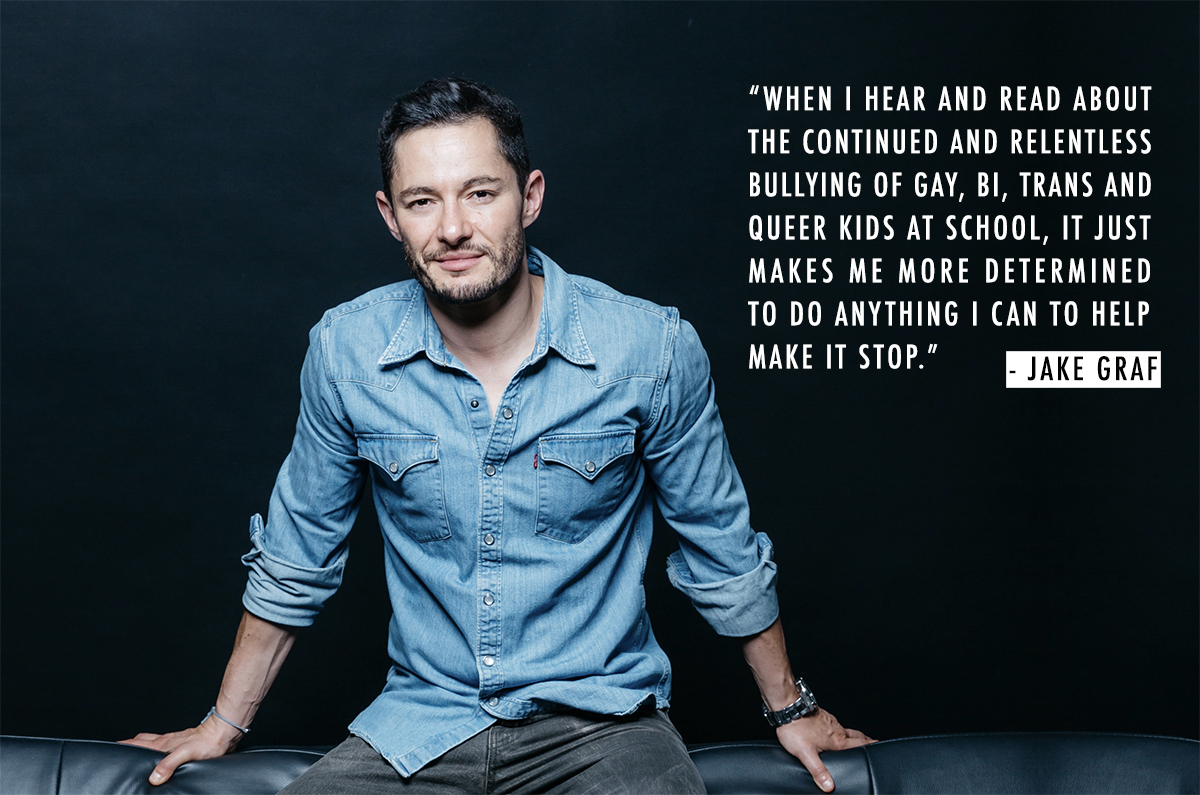
Photo credit: Paul Grace
DTL: You also starred in The Danish Girl, a film that tells the true story of the first trans woman in history to undergo gender reassignment surgery. How has trans visibility developed in the film industry over the years?
Jake: When I was a kid growing up in the 90’s there was no trans representation whatsoever in the media or in movies, and it made me feel like a lonely little weirdo who would never be happy or find anyone to love or accept me for who I was. I didn’t even know trans men existed until I was about 16! Trans visibility in film has certainly increased, but whereas until just a few years ago trans characters were either the punchline of the joke, the murderer or the person who dies at the beginning of the film, now we are seeing much more realistic, authentic and diverse trans roles on screen. Sadly those parts are still being played mainly by cisgender actors, but that will change too as more trans actors gain exposure. It does still tend to be trans women that we are seeing rather than trans guys, but gradually more men are gaining visibility and I’m determined to cast as many of them as I can!
DTL: As a director and a trans activist who plays a huge role in contributing to positive change in trans representation, do you think this is a positive development?
Jake: I know from personal experience how vital it is to be able to look out at the world and see other people just like you, but while some folk feel that any representation is a positive thing, I very much believe that we must be pushing for positive representation that will not only show the world that we exist, but that we too can be happy, successful and productive people who really aren’t so different to everyone else!
DTL: As someone who’s frequented their fair share of magazine covers, tell us a bit about the journey you’ve had with body confidence?
Jake: When I was little my mum let me have my very curly hair cut quite short, and I was largely able to wear what were considered ‘boys’ clothes and so spent much of my youth trying my best just to ‘pass’ as male, despite everyone around me endlessly telling me otherwise. I was filled with a feeling of absolute dread as puberty approached because I knew that my body was about to change almost unrecognisably and that life was about to get much harder, which of course it did. Knowing that I could no longer get away with telling people I was a boy, I tried my best to blend in with the girls and grew my hair long, tried wearing feminine clothes, and started hanging out with the girls, which I’d never done before. That was even harder because I felt like I was faking it and I just ended up with crushes on all of my female friends! I remained desperately unhappy in my body for the next decade, hating my own reflection, hunching over to hide my chest and becoming very withdrawn.
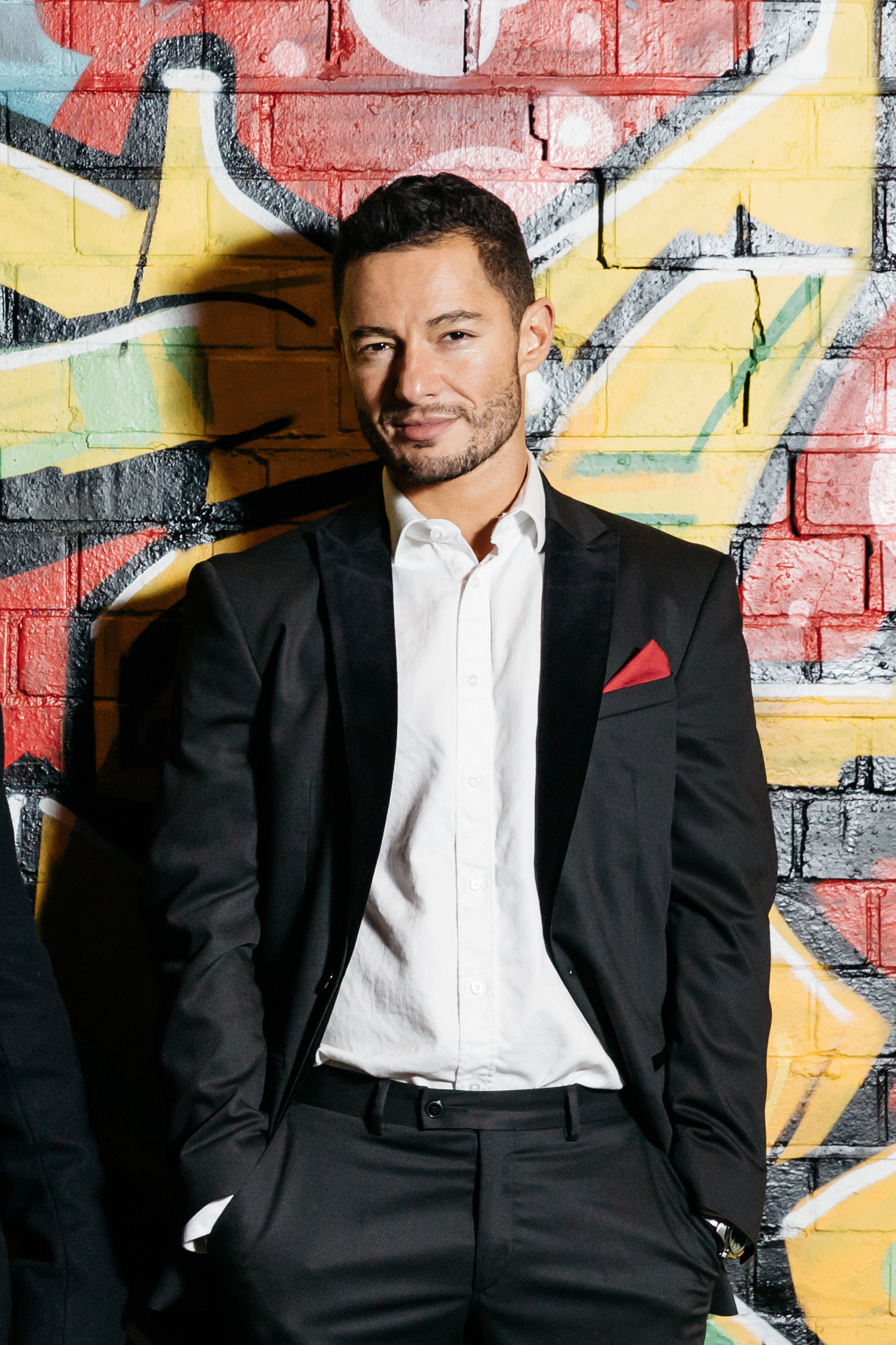
Photo credit: Paul Grace
“When I finally started my medical transition I thought that everything would change the second I had my first testosterone shot, which of course it didn’t! What did change though was that I finally had a glimmer of hope that one day I would be able to live life as a happy, normal guy.”
Finally comfortable and confident enough to go to the gym, I began getting in shape and actually started to like my body. It took a lot of hard work, and I’ll never be one of the ‘big’ guys in the gym, but I finally saw myself looking back at me in the mirror. Being asked to appear on magazine covers was truly mind-blowing, and something I wish the 15-year-old me had been able to see. It certainly would have made things a bit easier back then!
DTL: On the DTL blog, we try to be as helpful as we can on advising people how to be a better trans ally. As someone who has written about this topic before, do you have any advice to offer?
Jake: I think that it’s really important to respect a trans person’s identity and identification and to make them feel as safe as possible in a world that is often a scary and uncertain place. Aside from the basic rules such as never outing someone, never asking about their surgeries, birth name, pre-transition photos or genitals, I would hope that an ally would just treat us with the same consideration and care that they would anyone else. I would also say that if you witness homophobia, transphobia or biphobia, speak out, make it clear that it’s not acceptable, and show support to those that aren’t strong enough to do so without you. It may seem like a small thing to you, but you could just be saving someone’s life.
DTL: On our community, we offer support to young people who could do with someone to talk to about gender-related bullying and other gender-related issues. Do you have any words of encouragement for someone who might be struggling at the moment?
Jake: I know that this may sound like a cliché, but things really do get better:
“You will find your tribe and your people, friends that love and accept you for exactly who you are.”
More often than not, your close family will eventually come round. If they don’t, then that’s absolutely THEIR loss and certainly not your fault. Some people are just scared of what they don’t understand and will run from it out of instinct. I know that doesn’t make it better but if someone keeps putting you down, it’s more often that they’re unhappy with who they are. Try not to let it make you doubt how amazing and brave you are just for being yourself.
